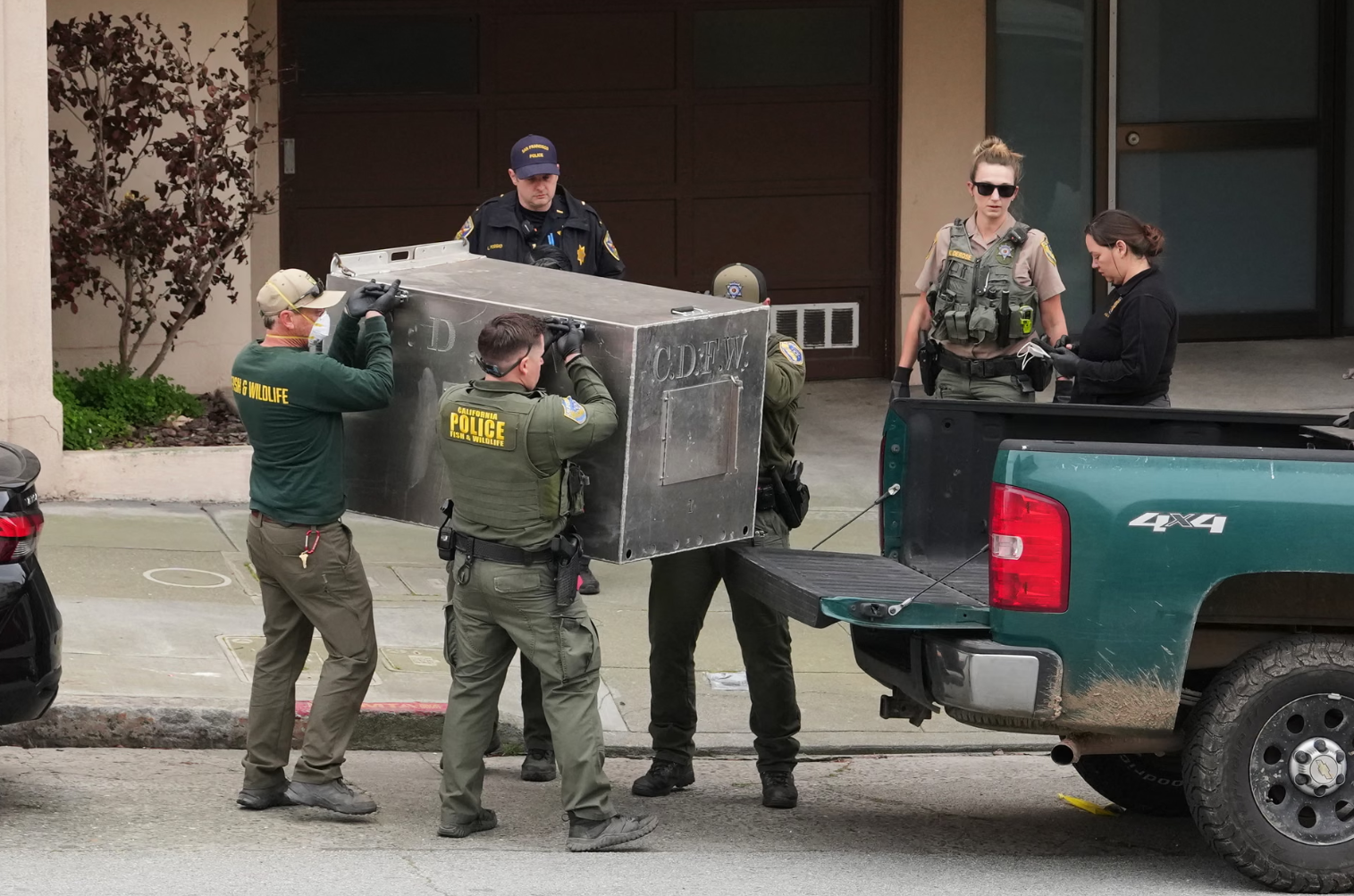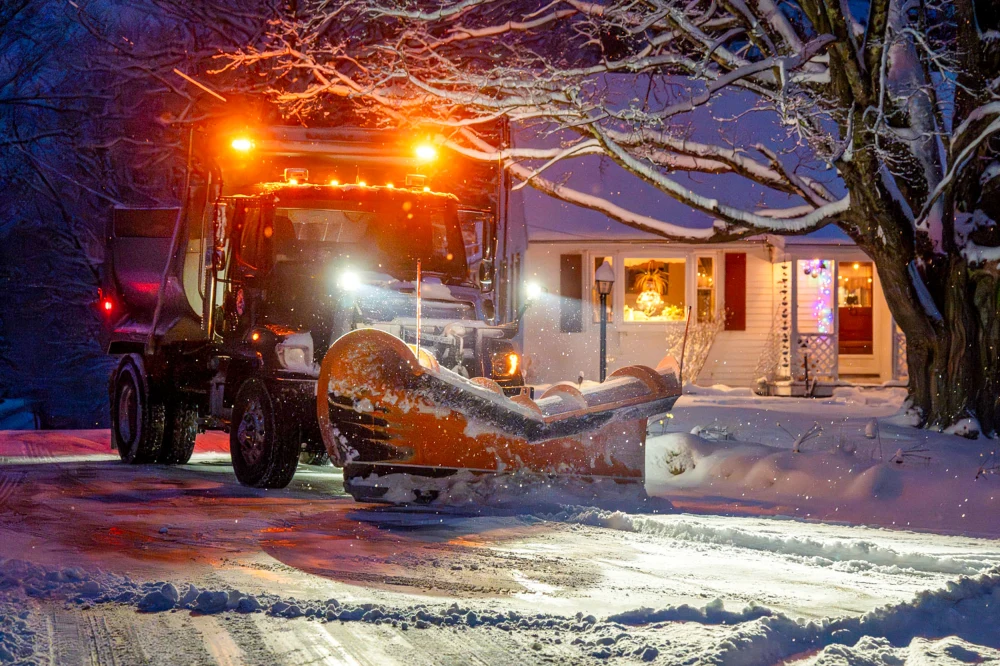Thousands of people attended the annual March for Life, joined by high-profile advocates and speakers, in Washington, D.C., on Friday to oppose abortion amid a massive snowstorm that blanketed the city.
The March for Life is an annual event held since 1974, the year after the Supreme Court’s decision in Roe v. Wade, to rally anti-abortion activism across the United States, with attendees marching from the National Mall up toward the United States Capitol Complex. Nearly 100,000 people were expected to attend the march on Friday, according to Jeanne Mancini, the president of the March for Life Education and Defense Fund, which organized the event, who opened the proceedings.
“I am, myself, the product of an unplanned pregnancy. In January of 1972, exactly one year before Roe v. Wade, my parents, who were just teenagers at the time, chose life, and I am very profoundly grateful that they did,” said House Speaker Mike Johnson, who addressed the gathering before the march began. “America is the only nation in the world founded upon a creed … listed with theological lucidity in the Declaration of Independence … all men are created equal, not born equal, [but] created equal.”
Johnson was among several members of Congress and prominent individuals in attendance, which included Republican Sen. James Lankford of Oklahoma, Republican Rep. Chris Smith of New Jersey, the University of Michigan Wolverines head coach Jim Harbaugh, former National Football League tight end Benjamin Watson as well as three-time Grammy nominee Danny Gokey, who performed the national anthem at the event.
“[I’m pro-life] for the sanctity of life. You know, we all talk about human rights. There’s really no rights that are important unless you have the right to life,” said Harbaugh, who led the Wolverines to victory in the 2024 College Football Championship, to the Daily Caller News Foundation backstage. “There are [pro-life players] on our team, too.”
The march itself began shortly after noon and proceeded towards the U.S. Supreme Court via Capitol Hill. While conservative and Christian groups — particularly of the Catholic denomination — made up the bulk of attendees, individuals of different backgrounds told the DCNF they had come from across the country to express their opposition to abortion.
“Gay, straight, black, white. All unite for pre-born rights!” shouted a group of left-wing supporters of the March on Constitution Avenue as it passed them, one who sported a sign that read “LGBT+ Democrat Pro-Life” on it. “Abortion is oppression! Abortion is violence! Abortion is murder!” they continued, while another left-wing protester wore a sign reading “Queer, Latina, Feminist, Rape Survivor, Against Abortion.”
“About 25% of Democrats are pro-life and support reasonable limitations on abortion and regulation on abortion to make sure it’s safe for women,” said Kristen Day, the executive director of Democrats for Life, to the DCNF as she marched in the procession. “We think the focus needs to be on how do we provide options to women. How do we make sure that she has the support and the resources to make a choice? Because when you look at states like California and New Jersey, they’re shutting down pregnancy support facilities.”
Signs and slogans of several varieties were exhibited by participants in the march as they moved toward the Supreme Court. Many held signs reading “I Am The Pro-Life Generation,” “Let Their Hearts Beat” and “Make More Babies,” as well as other creative banners — with themes ranging from Dr. Seuss to Winnie the Pooh — while others held up crucifixes or waved flags with the names of their schools, colleges and hometowns.
“There are quite a few universities in our group that have very active pro-life chapters …We’ve tabled quite a few Fridays last semester and it was always wonderful to see so many students would come out and support,” said Victoria Baker, a student at Cornell University and president of an anti-abortion group, there, who was marching under a banner that read “The Ivy League for Life + MIT and Stanford.” Baker said that, in her experience, many Ivy League students indicate that they support restrictions on abortion “somewhere in the second trimester … I was actually interested to see how many students thought there should be some form of restriction on abortion.”
One large banner that spanned the length of the crowd read “Hey GOP, We Vote Pro-Life First.” The sign reflected the assertiveness of conservative attendees about their anti-abortion views at a time when some Republican politicians, such as former President Donald Trump, have criticized anti-abortion advocacy as being the reason for electoral losses across the country.
“[W]ith the states, [pro-abortion advocacy] is being bankrolled by George Soros and all of the ACLU and Planned Parenthood’s that are coming into these states and they are pushing misinformation, telling women that if you do not vote for this, then you will not get miscarriage care,” said a representative for Susan B. Anthony Pro-Life America to the DCNF. “That is a lie, And we have got to do all that we can to refute these lies.”
The spokesperson diagnosed the problem as a financial one. “[W]e have got to do all that we can to raise the money because as we saw in Virginia, it was a 10 to one when it came to abortion ads on television,” she said.
Among the concerns cited by elected Republicans with pro-life advocacy are the week limits of state abortion bans, with Trump calling legislation enacted by his home state of Florida to prohibit the procedure after six weeks a “too harsh” and a “terrible mistake.” Activists speaking with the DCNF rebuffed the notion that their advocacy was a political issue for the GOP, particularly in the 2024 presidential election.
“I support any candidate who will pledge to stand with us, at minimum, to sign a national heartbeat protection law if that goes to their desk,” said Kristan Hawkins, the president of Students for Life of America, to the DCNF, who also identified efforts to curb chemical abortion pills as a priority. Laws that ban abortion after a fetal heartbeat is detected have been enacted by several states, and effectively prohibit abortion after five to six weeks of pregnancy.
“Our water [is polluted] when these chemical abortion pills are flooding into our waterways, with chemically tainted blood placental tissue of known endocrine disruptors that NIH-published studies prove harm fish aquatic and plant life,” Hawkins added, referring to federal advocacy by anti-abortion groups to use environmental laws to target chemical abortion drug sales.
Upon reaching the Supreme Court, march attendees concluded their demonstrations before dispersing in the afternoon. Several receptions were hosted by members of Congress at the Capitol complex for delegations from their states, while others dispersed to various anti-abortion parties hosted across the city.
“It’s been very smooth,” said Thomas Manger, the chief of the United States Capitol Police, to the DCNF after the march, whose organization was joined by hundreds of police officers from Maryland and Virginia for support. “This is typically a march that goes on without too many issues … occasionally there are counter-protesters but [that] didn’t seem to be an issue today.”




